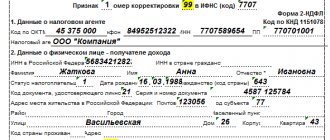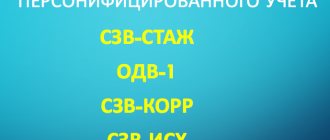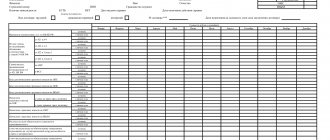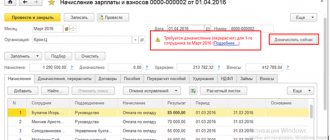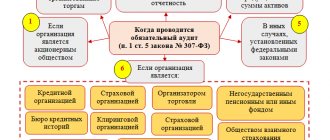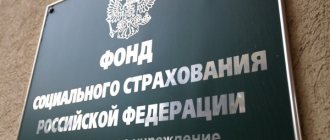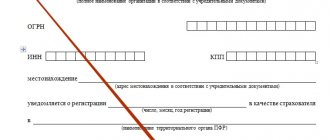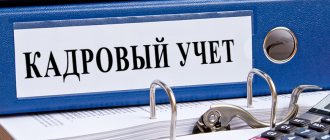Not always field or desk audits of auditors of extra-budgetary funds, and in particular the Pension Fund of Russia, end with a result that satisfies both parties. What should you do if you are confident in the accuracy of the information provided to the Pension Fund of Russia, but based on the results of the audit, you received a report that reflects violations?
Minor contradictions can be eliminated by agreement with the inspector immediately during the inspection. But if the policyholder does not agree with the Fund’s conclusions, the disagreement will have to be resolved by sending a reasoned explanation or objection to the PFR inspection report in the manner prescribed by law.
What are they fined for?
The basis for a fine will be, in particular, submission of reports later than the deadline. Let us remind you that the deadline for submitting information is the 15th day of the month following the reporting month. It is clear that the deadline that falls on a weekend is moved to the next weekday. The fine is 500 rubles. for each insured employee.
It’s one thing if the company has only a few employees, but if the number is high. The amount of the fine will be quite significant. How to challenge a Pension Fund fine for late submission of SZV-M? We'll talk about this in the article.
It is most prudent not to delay submitting reports, in particular, with the SZV-M form. After all, information must not only be sent on time, but also accepted by the fund (clause 39 of the Instructions, approved by order of the Ministry of Labor dated December 21, 2016 No. 766n). By submitting the form in advance, the company will have time to respond to errors identified by the Fund and correct them without penalty.
What will the Pension Fund check?
When conducting an audit by a pension fund, companies will first need to provide documents confirming the basis for the calculation and payment of pension contributions, as well as the correctness of the calculation of these contributions. Such documents include:
- constituent documents;
- orders on the company's accounting policies;
- licenses;
- documents confirming payment calculations;
- accounting reports (reporting documents, explanatory notes, auditors' reports);
- accounting registers for settlements with personnel and accountants;
- cards for individual accounting of accrual of remunerations and payments;
- administrative documents, agreements, contracts, collective agreements, orders;
- bank and cash documents;
- salary statements, statements and orders;
- individual accounting documents for compulsory pension insurance.
It should be remembered that until 2021, the Pension Fund controlled the procedure for calculating and paying insurance premiums for compulsory pension and health insurance. Since the beginning of 2021, control over these issues has passed to the Federal Tax Service. Therefore, the Pension Fund of the Russian Federation can check the calculations of contributions only for periods that ended before the beginning of 2017 (
How will it be processed?
If Pension Fund employees identify violations, they will draw up a report. The form of this document was approved by Resolution of the Pension Fund Board of November 23, 2016 No. 1058p. The policyholder will be made aware of it. If the company does not agree with the act, then written objections must be sent. This must be done within 15 days after receiving the act.
After considering the objections, the controllers will decide whether to hold the insured accountable or not. If the Foundation insists on a fine, it will have to be paid. How to challenge a fine for late submission of SZV-M in 2021? Go to court.
Companies with more than 24 insured people must submit reports only in electronic form. Submitting SZV-M on paper will also be the basis for a fine. Its size will be 1,000 rubles. (Part 4 of Article 17 of the Federal Law of April 1, 1996 No. 27-FZ).
Explanations and objections: the difference between concepts
The policyholder has the right to express his opinion on the results of the inspection by a representative of the Pension Fund of Russia by drawing up an explanation or objection to the act of the Pension Fund of Russia. What are the differences between these documents, if their essence, in principle, does not differ significantly?
Explanations are submitted by the policyholder to an oral or written request from the Fund's auditor during the audit. A representative of the Fund has the right to request such explanations if:
- errors were discovered in the calculations and payment of insurance premiums;
- discrepancies were identified between the information submitted by the payer in reports to the Fund and the information reflected in the documents presented during the audit;
- discrepancies were found in the content of documents submitted to the auditor for verification.
An objection to the PFR inspection report is submitted by the policyholder only after it has been delivered. The policyholder can file objections in cases where he does not agree with the conclusions specified in the act, or during the audit the auditor made substantive or procedural errors.
Good chances
A company that is late in submitting a report will be fined. Moreover, the Pension Fund will take a formal approach and assign a fine based on the total number of people in the report. Officials cannot reduce the amount of the fine. However, the court can reduce the amount of the fine. How to challenge a fine for SZV-M? File a claim. We list the circumstances that will help reduce the fine.
| Facts of the case | Initial fine amount | Final fine amount | Judgment |
| Presence of mitigating circumstances (the violation was committed for the first time, it was eliminated independently, there was no intent, there were no negative consequences) | RUB 30,500 | RUB 3,050 | Resolution of the Arbitration Court of the Ural District dated October 27, 2017 No. F09-5705/17 |
| A large fine does not meet the principles of justice. The delay is due to technical problems. The organization independently submitted the supplementary form SZV-M. The fine is disputed. | 38,000 rub. | 1,000 rub. | Resolution of the Arbitration Court of the Moscow District dated April 19, 2018 No. F05-4104/2018 |
| The company was late due to lack of electricity and breakdown of network equipment | 74,000 rub. | 0 rub. | Resolution of the Arbitration Court of the Volga-Vyatka District dated July 17, 2017 No. F01-2826/2017 |
| Minor one-day delay | RUB 478,500 | 500 rub. | Resolution of the Arbitration Court of the Central District dated April 27, 2018 No. F10-1071/2018 |
This is the current judicial practice regarding fines for SZV-M.
Read also
16.01.2021
Which companies are checked first?
The Pension Fund has the right to carry out inspections in any companies together with the Social Insurance Fund. At the same time, Pension Fund employees can study issues of compulsory insurance, and employees can study issues of insurance for temporary disability and in connection with maternity. The Pension Fund of Russia, the Social Insurance Fund, and now the Federal Tax Service are attracting special attention to:
- expenses financed by the Social Insurance Fund;
- untimely submission of reports;
- non-taxable payments;
- application of reduced tariffs;
- inconsistency of calculations based on the results of a desk audit;
- arrears of contributions;
- frequent adjustments to reports;
- other violations.
Important! A company can avoid claims from regulatory authorities if all reports are submitted in a timely manner and the authorities’ demands are not left unanswered. In addition, when calculating contributions, you should carefully check all amounts, and also keep documents that allow you to justify the company’s actions.
Fine amount
In accordance with Federal Law-27 Art. 17 hours 3 and art. 11 clause 2.2 monthly failure to submit personalized accounting information within the prescribed period is punishable by a fine for the policyholder. Officials are also subject to administrative liability for distortion or failure to submit data.
To help you figure out what punishment you face under Art. 15.33.2 of the Code of Administrative Offenses of the Russian Federation, and which - within the framework of Federal Law No. 27, brought all fines into the table:
| Violation | Amount of punishment | Payer | Base |
| Violation of the deadline for submitting information | 500 rub. for each employee | Policyholder (organization, individual entrepreneur) | Part 3 of Article 17 of Federal Law No. 27-FZ of April 1, 1996 |
| 300–500 rub. | Executive | Article 15.33.2 of the Code of Administrative Offenses of the Russian Federation | |
| Providing incorrect or incomplete data | 500 rub. for each employee, regardless of the number of errors in his data | Policyholder (organization, individual entrepreneur) | Part 3 of Article 17 of Federal Law No. 27-FZ of April 1, 1996 |
| 300–500 rub. | Executive | Article 15.33.2 of the Code of Administrative Offenses of the Russian Federation | |
| Submitting information in paper form instead of electronically (for more than 25 people) | 1,000 rub. | Policyholder (organization, individual entrepreneur) | Part 4 of Article 17 of Federal Law No. 27-FZ of April 1, 1996 |
From this we see that the amount of the fine depends on the number of employees in whose data errors were made. It varies from several hundred to tens of thousands of rubles.
Objections to the PFR inspection report
If the company has objections to all or only certain points of the inspection report, then it has the right to draw up an objection to the report in writing. This must be done within 15 working days from the date of receipt of the relevant act from the Pension Fund.
The company must support its objections with supporting documents. As a rule, these are certified copies that can confirm the validity of these claims. The company is not obliged to do this, but attaching supporting documents will significantly increase the chances of challenging the provisions of the act.
Is it possible to challenge
Sometimes the fine for a failed SZV-M can be challenged in court. The courts often side with the policyholder if there are objective reasons for the delay in the report or the Pension Fund of the Russian Federation has not taken into account other extenuating circumstances. These include the insignificance of the violation, equipment failures, and even the personal circumstances of the persons responsible for the shipment.
The table provides examples of such mitigating circumstances from judicial practice:
In all cases, the fine for violating the deadlines for submitting the SZV-M was significantly reduced or was cancelled.
FIU does not agree
The Foundation decided to go further and filed an appeal. According to officials, SZV-M is not a general document, since information is submitted in relation to each insured person . In this regard, representatives of the Pension Fund insisted that in this case there was a failure to provide information. The body was guided by the explanations of the central office of the Pension Fund of Russia, given, for example, in letter dated March 28, 2018 No. 19-19/5602.
The judges concluded that submitting a form without information about one of the employees could be regarded as providing incomplete information. And since the original form was submitted on time, there are no grounds for a fine (decision of the Twenty-first Court of Appeal dated 03/06/2018). In addition, there is a resolution of the CA CO dated May 29, 2018 on the same case, in which the arbitrators confirm the following: the policyholder submitted a corrective form, and this is nothing more than the exercise of his right to supplement and clarify information in the initial report . That is, exactly what is stated in Article 15 of Law 27-FZ.
The Supreme Court has ruled in favor of policyholders on similar issues. For example, this is evidenced by the rulings of the Supreme Court of the Russian Federation dated March 26, 2018 No. 306-KG18-1470 in case No. A12-3595/2017, dated May 10, 2018 No. 303-KG18-99 in case No. A73-910/201. Therefore, if the Pension Fund decides to appeal to the Supreme Court in this case, it will most likely fail there too.
Preparing for the test
During an on-site inspection, all activities are carried out by the regulatory authorities on the territory of the organization being inspected. However, if the company does not have the opportunity to provide premises for the inspection, it can be carried out at the location of the regulatory authority. The inspection can only be carried out by those persons indicated in the list of the inspection decision. Therefore, before giving access to documents, you should check the documents of the fund’s representatives.
If the inspection does not reveal any inconsistencies, the company does not have the right to refuse access to representatives of regulatory authorities directly to the company’s territory. If they are denied access, the regulatory authority will draw up an obstruction report and impose a fine.
Upon completion of the inspection, the regulatory authority issues a corresponding report. This is the basis for holding the company accountable. When a company does not agree with the fund’s decision, it has the right to file an objection. It is drawn up in writing with supporting documents attached. The objection is sent to the head of the Pension Fund, who must make a final decision.
Competent objections = good solution to the “stock” check
The organization is not fined for this. After all, the legislation:
- it is stipulated that giving explanations is the right, and not the obligation, of the payer of contributions;
- no liability has been established for failure to provide explanations and for failure to make corrections in the calculation of accrued and paid insurance premiums.
We recommend reading: How much does it cost to train for a traumatic pistol in Tyumen
And if there is a practice when magistrates fine a manager or chief accountant for failure to provide explanations, then this is only 300-500 rubles; In addition, some organizations successfully appeal demands for explanations in court.
There is no need to give explanations if the requirement for their presentation:
- does not contain the signatures of the people conducting the inspection;
- transmitted by telephone;
- contains erroneous information about the policyholder (suppose it is not your name);
- not displayed in accordance with the form (hereinafter referred to as Order No. 698n);
- awarded upon completion
Self-correction of an error in SZV-M is not a reason for a fine
The company made a mistake in the period specified in the SZV-M, independently discovered the error and submitted an updated report, but later than the deadline for filing the SZV-M for the corrected period (we talked about this in detail here). The Pension Fund of Russia fined the company a tidy sum; the courts of first instance supported the Pension Fund of Russia.
The RF Supreme Court made a different decision. The high court judges noted the fact that the PFR inspectors themselves did not notice the error and did not demand that it be corrected. The company showed good faith when it independently discovered the error and filed the correct report.
The legislation does not provide for a period during which it is allowed to submit clarifications to the SZV-M report without a fine. Consequently, the RF Armed Forces considered that the general rules for filing mandatory reports on taxes and contributions (Article 81 of the Tax Code of the Russian Federation) may apply to the submission of clarifications. If the person submitting the report discovers and corrects an error before the supervisory authority does so, then such correction should not be fined.
Advice to those taking SZV-M: when correcting errors in the report, record the fact that you identified and corrected everything yourself, without the participation of Pension Fund inspectors. Then, in the event of a judicial challenge to the fine, you will be able to refer to the opinion of the Supreme Court of the Russian Federation on a similar situation (Determination of the Judicial Collegium for Economic Disputes of the Supreme Court dated July 22, 2019 No. 305-ES19-2960).
vozrazheniya.jpg
Related publications
Not always field or desk audits of auditors of extra-budgetary funds, and in particular the Pension Fund of Russia, end with a result that satisfies both parties. What should you do if you are confident in the accuracy of the information provided to the Pension Fund of Russia, but based on the results of the audit, you received a report that reflects violations? Minor contradictions can be eliminated by agreement with the inspector immediately during the inspection. But if the policyholder does not agree with the Fund’s conclusions, the disagreement will have to be resolved by sending a reasoned explanation or objection to the PFR inspection report in the manner prescribed by law.

